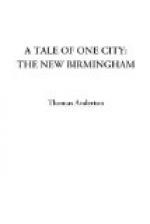With Richter’s appearance as conductor, some important changes and reforms were effected in the orchestral arrangements of the Festival. For one thing, the band was cut down in number. This, it was said, was in consequence of Richter’s opinion that the balance of power was disturbed by too great a preponderance of string tone, but it is just possible that economy was considered when the change was made. Anyway, in 1885 there were over twenty stringed instruments less than in Costa’s last year, 1882.
This alteration was a notable one, and regrettable in some ways. The extra large string band that Costa would have made the Birmingham Festival orchestra something very special, and the result was some striking effects not heard elsewhere. Nowhere now do we hear that tour de force which was almost electrical in the rush of violins at the end of the chorus “Thanks be to God” in the “Elijah,” in Beethoven’s “Leonora” overture, and in the last movement of the overture to “William Tell.” The effect of the violins—between fifty and sixty in number—was something magical in the works just named. To put the matter in brief detail, under Costa’s conductorship the string band numbered 108 players, when Richter took the orchestra in hand, it was reduced to eighty-six. I will not discuss the expediency of the change. Suffice it to say that the Festival band is now as good, perhaps better, than it ever was, save in the matter of numbers.
To sum up very briefly the Festivals since 1885—the year that Richter succeeded Costa—the meeting of 1888 was remarkable for nothing that made any permanent notch in the record of the Festivals. Parry’s oratorio “Judith” was the chief novelty, but, in spite of its masterly merit as a work of musical art, it was hardly received with the favour it deserved.
The Festival of 1891 saw the production of two important new works, namely, Stanford’s dramatic oratorio “Eden” and Dvorak’s “Requiem Mass.” With respect to these compositions, they have scarcely been heard, I think, since their initial performances. Stanford’s “Eden” contains some fine writing, but there was, perhaps, too much of it. Dvorak’s “Requiem” was something of a disappointment, and its first rendering anything but satisfactory; indeed, some of the numbers, I remember, narrowly escaped coming to utter grief.
In 1894 three new productions were heard. These were Parry’s “King Saul”—a very recondite, musicianly composition—but too long; “The Swan and the Skylark,” a fanciful little cantata by Goring Thomas; and a “Stabat Mater” by G. Henschel.
Nothing at the Festival of 1897 made any mark. There was a new “Requiem” by Stanford, but like many other Requiems, it rather celebrated its own death. A new work by Arthur Somervell was heard, and, though favourably received at first, like some other Festival compositions it seems now to have vanished into the ewigkeit.




